The Call to Arms of The Manhattan Project
by Dennis Speed
January 2016
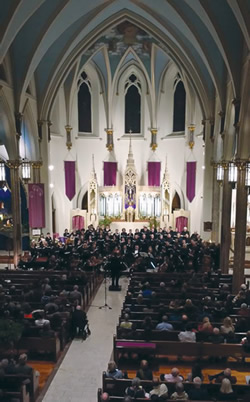 View full size Schiller Institute
The performance of Handel’s Messiah at the Sacred Hearts of Jesus & Mary/Saint Stephen R.C. Church in Brooklyn, New York, Dec. 19, 2015. |
A PDF of this article, published in the January 1, 2016 issue of Executive Intelligence Review, is re-published here with permission.
I am astounded that I found myself agreeing with Lyndon LaRouche. Handel’s Messiah need not be performed in a tuning system with “C”=246 hertz, and “A” no higher than 432 Hertz, instead of A at 440 or higher, but I am listening to the Messiah at the Unitarian Church at 80th and Lexington in New York, being conducted by John Sigerson, and sponsored by the Schiller Institute, with Helga and Lyndon LaRouche’s encouragement . . . this is an extraordinarily fine performance, fitting within the natural vocal ranges of the soloists and chorus, and with a very strong orchestral support.
December 28, 2015 —As in the earlier experience of Boston’s January 2014 Schiller Institute performance of Mozart’s Requiem—a 50th anniversary recognition and re-enactment of Jacqueline Kennedy’s musical request immediately following the assassination of her husband, President John F. Kennedy—disbelievers in the legitimacy of the idea of “proper tuning”—as well as the urgent necessity of the views of Lyndon LaRouche—were grudgingly converted, again, in New York City over December 19 and 20. In Brooklyn on Saturday, and Manhattan on Sunday, a truthful performance of Handel’s great Messiah was rendered by a small orchestra and by a 75-person chorus, plus soloists, that performed at the “Verdi tuning” of middle C equal to 256 cycles per second. (The A is tuned to a range of 427-432 cps.) This is nearly a quarter-tone or more lower than the tuning presently in use at several of the most prestigious opera houses in the United States and Europe. Higher tuning creates a distortion in the music as originally composed by Mozart, Beethoven, Bach, and other of the Classical composers.
The New York Schiller Institute Community Chorus was expressly created to reverse this arbitrary but intentional distortion, and to instigate a revolt against the dumbing-down of the over one million students in the nation’s largest school system—and of American culture and civilization as a whole—by beginning with the central subject of music.
Brunelleschi Again
The just under one thousand persons who directly participated in those two concerts were presented not with a mere musical performance, but with a new standard for American citizenship. Music, and musical literacy and practice, including public performance by the citizenry, is as much a right and a responsibility of free government as is the bearing of arms to defend one’s nation.
The proper tuning allows for the natural placement of the human singing voice, which is the “first among all instruments” and the central starting point for all forms of instrumental composition as well. This, in turn, returns us to the musical setting, and therefore, the intention of the Classical composer, assuming the performers and conductor now submit to the power contained “behind” and “above” the composition’s text. Now, great music becomes intelligible and reproducible, including to all who have the desire to know it and to participate in it.
An Italian singer and vocal coach who has closely watched the process of organizing that the “proper tuning movement” directed by the Manhattan Project is carrying out, has referred to it by the name Risorgimento, the name associated with the Italian fight for independence in the which the composer Giuseppe Verdi was intimately involved, both as a musician and as a member of parliament. Not only does a “dark age” in Classical music exist in America today, according to this singer. Other singers and performers who have been active in the school system in Italy report that, since approximately 1975, the earlier Bel Canto singing tradition of that nation has also been largely ripped apart.
A trans-Atlantic collaboration to re-establish Bel Canto is therefore now under discussion, also involving collaboration with other organizations such as the Foundation for the Revival of Classical Culture, which sponsored the Sunday concert at All Souls Unitarian Church. Immediately, the goal of the Manhattan Project is the creation of a 1500-person chorus, the majority of whose members would make up the basis of a city-wide movement to establish an international core that wields Classical musical composition in the same way that Martin Luther King’s civil rights movement wielded the African-American Spiritual in the 1960s.
To that latter end, choral directors Diane Sare and John Sigerson have insisted that their singers familiarize themselves with the conductor Wilhelm Furtwängler, and particularly his performance of Schubert’s Ninth Symphony. Sare has had the choral members sing the instrumental parts of the opening of that symphony as an a capella exercise, not merely to emphasize the vocal quality of that composition, but to also reveal the vocal-contrapuntal compositional method that Schubert advanced for that symphony’s purpose.
Composer Johann Sebastian Bach, and particularly his first of what are called the Two-Voiced Inventions, has been similarly studied with vocalization, in the one-hour solfège class that precedes a Saturday dialogue with Lyndon LaRouche. It was LaRouche who inspired and conceptualized the 1980s campaign to re-establish the Verdi tuning, culminating in the work known as A Manual on the Rudiments of Tuning and Registration, published in 1992 by the Schiller Institute. Messiah conductor John Sigerson was one of the co-authors of that manual.
LaRouche has now urged that his Manhattan Project colleagues take up study of the Florentine scientist Filippo Brunelleschi (1377-1446), to really get at the purpose of music. And while many know that there was for hundreds of years an emphasis by the cathedral builders of Europe on musical proportion in architecture (such as the completion by Abbot Suger of the choir of the St. Denis Basilica in France in 1135-1144), Brunelleschi’s musical discoveries in the dynamic application of the art of proportion went far beyond anything that had been achieved up to that time.
While Brunelleschi is most famous for his creation of the Dome at Florence, recent discussion of his work on the small Pazzi Chapel was the occasion for comment by LaRouche.
Helga and I walked into this chapel, and the whole thing was like a living creature. You’re just in there. You were seized by this little chapel; it gripped you. You couldn’t get free of it! You have to get out of it in order to see something else which was there, but it was like the whole thing was a living process! And that was the quality of [Brunelleschi’s] work. Everything he did was absolutely unique, and highly variegated and so forth. And that’s what we have to look in ourselves for, in order to understand what we must do in dealing with the crisis which comes on us immediately right now.
Rooted in Deeper Science
The choral Manhattan Project will break new ground in the United States as LaRouche has proposed. There is an earlier New York City precedent. The 1890s project of Czech composer Antonín Dvorák (The New World Symphony), his American sponsor Jeanette Thurber, and, indirectly, Johannes Brahms in Europe, the National Conservatory of Music, was revived by the Schiller Institute in 1992, the 100th anniversary of Dvorák’s arrived in America.
Dvorák was eloquent on the purpose of this project. The Conservatory project was not only not supported by the United States Congress; it was also undermined by those who objected to the notion that America’s Classical compositions would emanate from African American Spirituals as their primary base. Only the yet-to-be-born New Orleans jazz was to be permitted, or other non-Classical practices, as African Americans were excluded summarily from schools and concert halls once the National Conservatory was effectively undermined by the mid-1890s. Dvorák was forced to return to Europe.
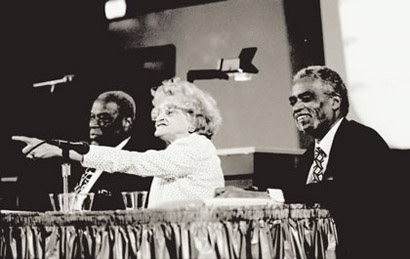
EIRNS/Stuart Lewis
On the podium at the Schiller Institute’s May 1994 conference “For a Marian Anderson National Conservatory of Music Movement”: Noted African-American musicians bass-baritone William Warfield (left), vocal coach and accompanist Sylvia Olden Lee, and tenor George Shirley (right). |
Today’s situation is far worse than that which Dvorák faced, because of the comparable destruction of the entire practice of Classical musical practice since the 1960s, in particular. So is the Presidency far worse. So is the Congress, and perhaps, also, the population. As Martin Luther King said, however, in his April 3, 1968 speech: “But I know, somehow, that only when it is dark enough, can you see the stars.” The worst of situations submit to and may be overcome by the power of poetry, as Percy Shelley attests.
The methods brought to bear by the Manhattan Project are rooted in a deeper science than that of the earlier cultural attempts. For example, in Europe the work of Brunelleschi, Nicholas of Cusa, and Johannes Kepler was succeeded by the foundation of the well-tempered system of musical composition by J.S. Bach. This is crucial for any “music student” to know and to master, but is generally unavailable in any music conservatory. By focusing on the Bel Canto voice placement principle, from the advanced standpoint of the compositions of the Classical period from Bach through Brahms, Dvorák, and Verdi, and the conducting principles advanced by Wilhelm Furtwängler, it is possible to introduce tens of thousands of New York citizens, in the short term, to a new, human view of language once characteristic of American oratory and public speech.
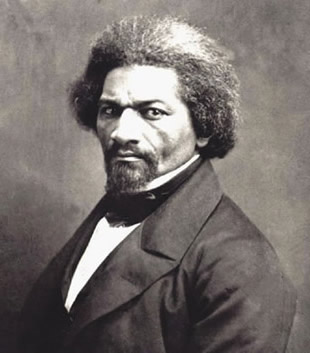
New York Historical Society
Frederick Douglass (1818-1895), a forceful advocate for Classical culture. |
Consider, for example, this sentence taken, essentially arbitrarily, from an 1851 Rochester, New York public address by former slave Frederick Douglass, whose every conscious moment was spent at that time clearly delineating the basis for the freedom of all men as clearly enunciated in the Constitution of the United States:
When I speak of such men, I can find no more appropriate language than the words of our Savior to the Scribes and Pharisees; and if any here deem the language I have already used harsh, or denunciatory, I commend to them the burning words of our Savior, applied eighteen hundred years ago to the same class of men as those who are now standing in the way of the slave’s redemption: “Woe unto you, Scribes, Pharisees, hypocrites, for ye pay tithe of mint, and anise and cumin, and have omitted the weightier matters of the law, judgement, mercy, and faith.
These Douglass speeches were virtually never written. They were declaimed indoors and outdoors, in all sorts of halls, schools, and churches, and with no amplification. Can anyone seriously imagine any of the Presidential candidates, or any of the too-prevalent semi-literate street orators, or television personalities, or talking heads, or Fox News screechers, or late-night television talk show hosts, or talk radio semi-pundits, speaking this way?
What was the music of speech that Douglass heard, and what is the music that they hear? What music is Donald Trump hearing? What music is Barack Obama hearing? What music is the Congress playing to drown out the sound of the Constitution being murdered every Tuesday by Barack Obama’s kill sessions?
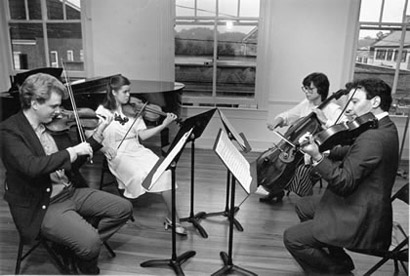
EIRNS/Stuart Lewis
A quartet of LaRouche movement members playing in August of 1985. From left: Seth Taylor, Nancy Shavin, Renee Sigerson, and David Shavin. |
Only by introducing a different practice of musical participation, including performance, in the population as a whole, in strategic parts of the United States, can this otherwise terminal civilizational condition be reversed. This is an essential pre-condition to re-establish the capacity of our society to elicit the moral fitness to survive from an otherwise doomed citizenry, now exterminating itself at an accelerating rate through drug and alcohol abuse, suicide, and various forms of non-lethal menticide, both self-inflicted and institutionally encouraged.
The defense of the republic cannot be successfully accomplished by the illiterate and semi-literate, no matter how good their announced intentions. In today’s United States, where the past two Presidential administrations have operated with the express intent of reducing the population of the United States itself through various forms of foreign and domestic warfare and economic deprivation, and where the sitting President holds a Nero-like and publicly acknowledged “kill session” every Tuesday,—is it any wonder that a mass shooting/killing occurs now every day?
Aldous Huxley was Wrong
In 1962, in a speech given at the University in California at Berkeley, after he had returned from a Santa Barbara Conference at the Center for the Study of Democratic Institutions, Aldous Huxley infamously remarked:
There will be, in the next generation or so, a pharmacological method of making people love their servitude, and producing dictatorship without tears, so to speak, producing a kind of painless concentration camp for entire societies, so that people will in fact have their liberties taken away from them, but will rather enjoy it, because they will be distracted from any desire to rebel by propaganda or brainwashing, or brainwashing enhanced by pharmacological methods. And this seems to be the final revolution.
In 1974, political associates of Lyndon LaRouche who had been victims of drug-induced brainwashing, sometimes combined with physical assault, countered the effects of that brainwashing through intensive listening to the late Beethoven string quartets. These compositions acted as a particularly effective emotional mooring point, more powerful in their expression of human creativity and triumph than the then-crude, opposing methods popularly utilized by police agencies of 40 years ago. Such pedagogical exercises, properly supervised, can in fact reverse the sorts of effects that Huxley terms final.
Yes, great damage has been done, but if people gain the courage to wipe out Wall Street and its false conception of the value of human life, then that act itself will re-establish the sanity of the society as a whole. But from where will come the courage to do this?
This is where the truly revolutionary role of Classical music composition and performance comes in. People are not, in the final analysis animals, unless they intend to be. Today, simply reintroducing Classical musical principles will have a salutary effect, but that is not enough. To save civilization, it is essential to exemplify the future which is worth saving. That future is not “programmatic.” It is not “pragmatic.” It is not a “good, empty campaign slogan” like “Hope and Change.” It must ring emotionally true, and be true at the same time.
As we enter January and a new phase of cultural crisis, forces associated with Lyndon LaRouche’s Manhattan Project have vowed, as their New Year’s resolution, to supply the American population with the ganas—the desire (or, less delicately, the “testicular fortitude”) to “take arms against a sea of troubles, and, by opposing, end them.”
The arms to be taken up, are not bullet-firing semi-automatic weapons, nor apocryphal “Star Wars” light-sabers. They are the same weapons that the great Italian patriot and artist Giuseppe Verdi forged and wielded in his battle for a sovereign, single nation of Italy, a “Risorgimento,” which would successfully conclude a battle that the Florentine poet and statesman Dante Alighieri had waged and died in the service of, more than 500 years before Verdi’s work. LaRouche has specifically identified the Italian Bel Canto vocal training approach as the urgently required basis for teaching Americans what LaRouche refers to as voice placement. This is not esoteric or unintelligible—rather, it is an attack on unintelligibility.
The grunting that passes for public speech, most luridly on display in the political campaign screeches of Donald Trump, or the even more offensive Chris Christie, should reveal to the listener the mind only of the criminally insane. This is apparently, however, not the case; many Americans seem to no longer be able to hear how simply crazy these people, and their present President, are.
Has America been driven morally tone deaf by the noise now called popular music? What is the relationship between what Americans choose to listen to, and the political candidates that they tolerate listening to? Sixteen years of depressive dumbing-down, first by the “country and western” braying of the not merely illiterate, but anti-literate George Bush, followed by the “smooth jazz” patter of Barack Obama’s constantly contentless statements, was recently rudely and thankfully interrupted by Vladimir Putin at the September United Nations 70th Anniversary session. Americans and the rest of the world gratefully witnessed, by comparison, two opposing speeches, containing two opposing conceptions of world leadership. One was human speech; the other was not.
Silent No Longer
The purpose of the Manhattan choral project is to equip each citizen who volunteers to reverse the demise of civilization and humanity that is presently the sure outcome of the downward spiral that Barack Obama’s United States is leading the world into, with the moral weapons to accomplish that mission. Our power in this, is the capacity of reason in others. This capacity must, however, be awakened as an emotional disposition to act, not merely as a contemplative consideration of “what might be the right thing to do.” We are past the time for that.
In welcoming the audience for the Sunday Messiah performance at All Souls Church, Lynn Yen, founder of the Foundation for the Revival of Classical Culture, concluded her remarks by saying:
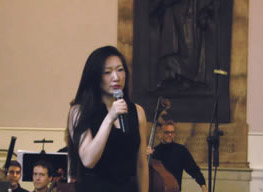 Schiller InstituteLynn Yen, Executive Director of the Foundation for the Revival of Classical Culture, makes opening remarks at the Dec. 20 performance of the Messiah at the All Souls Unitarian Church in Manhattan.
Schiller InstituteLynn Yen, Executive Director of the Foundation for the Revival of Classical Culture, makes opening remarks at the Dec. 20 performance of the Messiah at the All Souls Unitarian Church in Manhattan.You cannot convert a man, woman or nation by killing him, her, or it. “You have not converted a man merely because you have silenced him.” Handel’s Messiah, Beethoven’s Ninth Symphony, Mozart’s Requiem, and other works are the most powerful “weapons of mass instruction” ever devised in Western civilization. When will we learn that this, not the gun or the bomb, is the true way to help change humanity for the better? The answer is, we will learn it only when so many young people around the planet, starting in places like the United States, understand the true dignity of mankind, because they have heard and performed it in this music; you will then be unable to silence them any longer, because they will have for the first time heard and been moved by the sound of their own singular voice.
